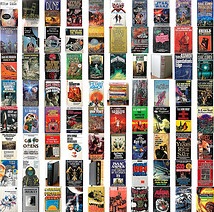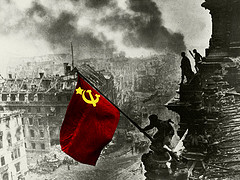Nov 21, 2010 7
A List of Science Fiction Books for Phil Johnson
 Phil Johnson has an ad agency (PJA) and also likes to read books. One day I asked him if he ever read science fiction and he said he didn’t. He asked me then to assemble a list of science fiction books I would recommend. I agreed to do so but thought, “Why should this list just sit in Phil’s inbox? Why don’t I, in fact, share it with the world via this worldwide, web-like platform I normally use for blogging about atheism, communism, and heavy metal?”
Phil Johnson has an ad agency (PJA) and also likes to read books. One day I asked him if he ever read science fiction and he said he didn’t. He asked me then to assemble a list of science fiction books I would recommend. I agreed to do so but thought, “Why should this list just sit in Phil’s inbox? Why don’t I, in fact, share it with the world via this worldwide, web-like platform I normally use for blogging about atheism, communism, and heavy metal?”
I’m no science fiction fanatic, and there’s probably a ton of great stuff out there that I’ve never even heard of (if you think so, PLEASE leave suggestions in the comments!), but this is the list I put together for Phil with the understanding that he has not even read some of the “classics”.
- Do Androids Dream of Electric Sheep? – The book upon which Blade Runner was based, of course, though much more engaging, involved, and philosophical than the film. It also contains at least one passage that, I believe, induces a palpable experience of existential vertigo. Watch out!
- Spaceman Blues: A Love Story – Brian Francis Slattery’s relatively recent vignette hits you with a heady melange of beat prose, hard-boiled pacing, and an undying love of New York City. It also depicts the banal horror of alien conquest.
- Dune – Speaking of melange, I was surprised to learn that Phil had never read this. The epic weirdness of David Lynch’s movie version aside, this novel is a virtuosic display of world-crafting that functions as political allegory, alternative history, and mystic tome.
- Neuromancer – William Gibson is a reserved—at times almost austere—stylist with a keen eye for future probabilities and a good record collection. Oh, and he coined the term “cyberspace”. One of his most recent books, Pattern Recognition, was about marketing.
- Schismatrix – I read this right after I read Neuromancer and thought that it actually contained more interesting ideas about social evolution, humanoid psychology, and the polymorphy of culture. If you like hallucinogenic drugs and societies built around the practice of sewing, you’ll love this.
- The Three Stigmata of Palmer Eldritch – Speaking of hallucinogens, Philip K. Dick’s novel about the extreme ennui experienced by space colonists, their flight into a world of Barbie dolls and pharmaceuticals, and the appearance of drug-peddling cyber-god works both as a parable of the 60s and a prophecy for the future.
- Radio Free Albemuth – This is the last Philip K. Dick novel I’m going to recommend but, in many ways, it is the best written (possibly because it was published posthumously and bears the trace of careful editing?). Dick had a religious experience in 1974 that obsessed him until his death. He wrote a lengthy exegesis of this experience and incorporated many of its details into his later novels (Valis, The Divine Invasion, Flow My Tears). It plays a central role in this novel as well but is handled in a more human, and less cartoony, way.
- The Deathworms of Kratos – This was Book 1 in a series called “The Expendables” (I also read The Rings of Tantalus). It is totally adolescent science fiction that made a big impression on me when I read it in seventh or eighth grade. The lesson here isn’t that this is a great book; the lesson is that, with science fiction, sometimes you just have to pick up a book because it has a cool cover or weird title and start reading (that is in fact what I did with Spaceman Blues above).
- The Alegebraist – This guy Iain Banks (or Iain M. Banks) is prolific and a very solid writer except that he sometimes gets too many plot threads cooking for his own good. This book definitely suffers from that but the weaknesses in plotting are more than made-up-for by the phantasmagoria of worlds, beings, and circumstances Banks conjures.
- A Deepness in the Sky – Vernor Vinge is the guy who invented “The Singularity” and he’s written a bunch of cool science fiction novels. Some may argue that this book’s predecessor, A Fire Upon the Deep, is better, but this creepy, slow-burning study of intergalactic colonialism, mind control, and revolt has stuck with me much longer.
I could recommend a bunch more, but that’s enough for now. Like I said, if you’re reading this and got something to add, go for it!

